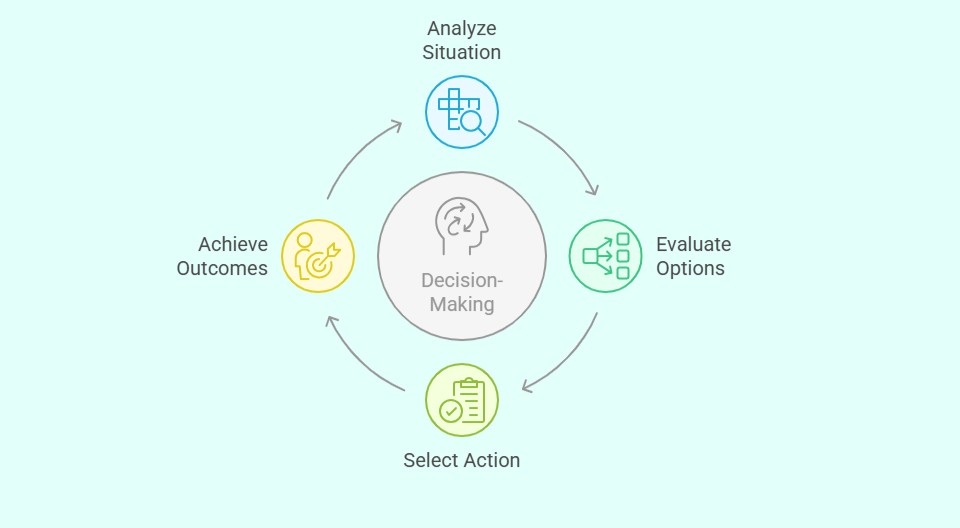
This comprehensive training course is designed to equip participants with the essential skills and frameworks for effective decision-making and problem-solving in strategic contexts. In today’s complex and rapidly changing business environment, the ability to make sound judgments, navigate uncertainty, and address strategic challenges is paramount for organizational success and sustainable growth.
The course will cover a wide array of crucial topics, including the fundamental principles of strategic decision-making, methods for identifying and framing strategic problems, techniques for gathering and analyzing relevant information, approaches for generating and evaluating alternative solutions, practical decision-making frameworks and tools, strategies for managing risk and uncertainty, effective implementation and evaluation of decisions, understanding collaborative decision-making and group dynamics, methods for overcoming cognitive biases, and developing a personal decision-making style.
Who Should Attend the Training
Objectives of the Training
Personal Benefits
Organizational Benefits
Training Methodology
Trainer Experience
Our trainers are seasoned strategic consultants and experienced business leaders with a proven track record of guiding organizations through complex decision-making processes and developing effective problem-solving capabilities. They bring a wealth of practical knowledge, real-world examples, and a deep understanding of the challenges and opportunities in strategic decision-making, ensuring participants gain actionable skills and valuable insights.
Quality Statement
We are committed to delivering high-quality training programs that provide tangible, transformative results. Our courses are meticulously designed, continually updated with the latest research and best practices in strategic decision-making, and delivered by expert practitioners to ensure participants acquire relevant, effective skills and knowledge.
Tailor-made courses
We recognize that every organization faces unique strategic challenges and has specific decision-making needs. We offer customized training solutions that can be specifically tailored to your industry, organizational context, current strategic priorities, and desired learning outcomes. Please contact us to discuss how we can design a bespoke program that aligns perfectly with your requirements.
Course Duration: 5 days
Training fee: USD 1300
Module 1: Foundations of Strategic Decision-Making
Module 2: Identifying and Framing Strategic Problems
Module 3: Gathering and Analyzing Information
Module 4: Generating and Evaluating Alternatives
Module 5: Decision-Making Frameworks and Tools
Module 6: Managing Risk and Uncertainty in Strategic Decisions
Module 7: Implementing and Evaluating Decisions
Module 8: Collaborative Decision-Making and Group Dynamics
Module 9: Overcoming Cognitive Biases and Improving Decision Quality
Module 10: Developing a Personal Decision-Making Style
Requirements:
· Participants should be reasonably proficient in English.
· Applicants must live up to Armstrong Global Institute admission criteria.
Terms and Conditions
1. Discounts: Organizations sponsoring Four Participants will have the 5th attend Free
2. What is catered for by the Course Fees: Fees cater for all requirements for the training – Learning materials, Lunches, Teas, Snacks and Certification. All participants will additionally cater for their travel and accommodation expenses, visa application, insurance, and other personal expenses.
3. Certificate Awarded: Participants are awarded Certificates of Participation at the end of the training.
4. The program content shown here is for guidance purposes only. Our continuous course improvement process may lead to changes in topics and course structure.
5. Approval of Course: Our Programs are NITA Approved. Participating organizations can therefore claim reimbursement on fees paid in accordance with NITA Rules.
Booking for Training
Simply send an email to the Training Officer on training@armstrongglobalinstitute.com and we will send you a registration form. We advise you to book early to avoid missing a seat to this training.
Or call us on +254720272325 / +254725012095 / +254724452588
Payment Options
We provide 3 payment options, choose one for your convenience, and kindly make payments at least 5 days before the Training start date to reserve your seat:
1. Groups of 5 People and Above – Cheque Payments to: Armstrong Global Training & Development Center Limited should be paid in advance, 5 days to the training.
2. Invoice: We can send a bill directly to you or your company.
3. Deposit directly into Bank Account (Account details provided upon request)
Cancellation Policy
1. Payment for all courses includes a registration fee, which is non-refundable, and equals 15% of the total sum of the course fee.
2. Participants may cancel attendance 14 days or more prior to the training commencement date.
3. No refunds will be made 14 days or less before the training commencement date. However, participants who are unable to attend may opt to attend a similar training course at a later date or send a substitute participant provided the participation criteria have been met.
Tailor Made Courses
This training course can also be customized for your institution upon request for a minimum of 5 participants. You can have it conducted at our Training Centre or at a convenient location. For further inquiries, please contact us on Tel: +254720272325 / +254725012095 / +254724452588 or Email training@armstrongglobalinstitute.com
Accommodation and Airport Transfer
Accommodation and Airport Transfer is arranged upon request and at extra cost. For reservations contact the Training Officer on Email: training@armstrongglobalinstitute.com or on Tel: +254720272325 / +254725012095 / +254724452588
| Course Dates | Venue | Fees | Enroll |
|---|

Armstrong Global Institute
Typically replies in minutes